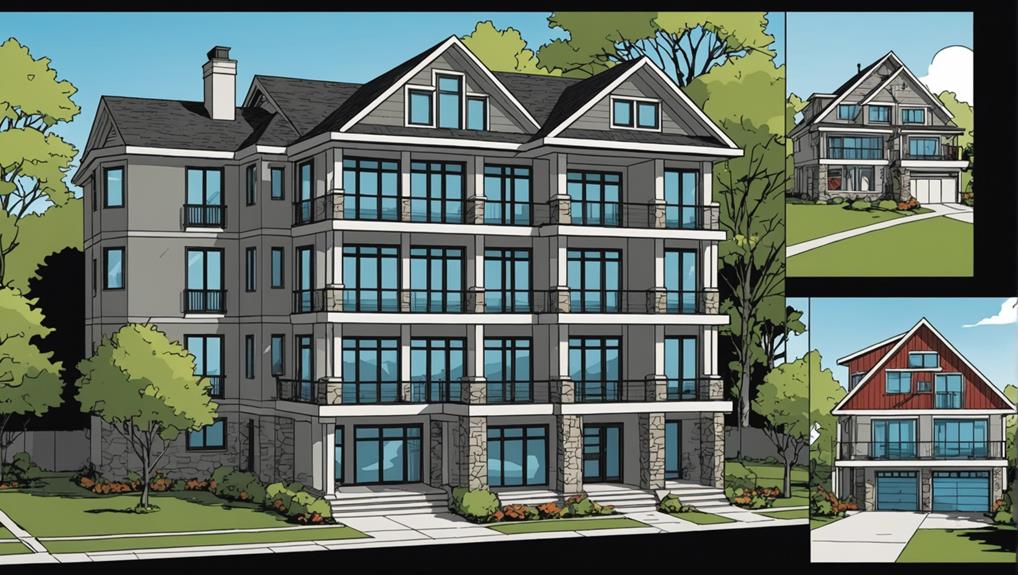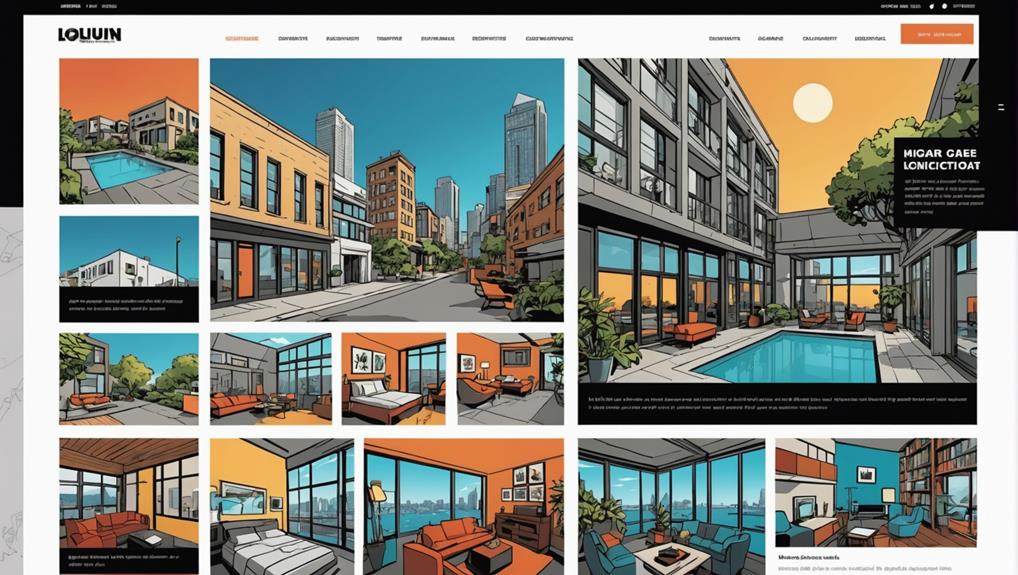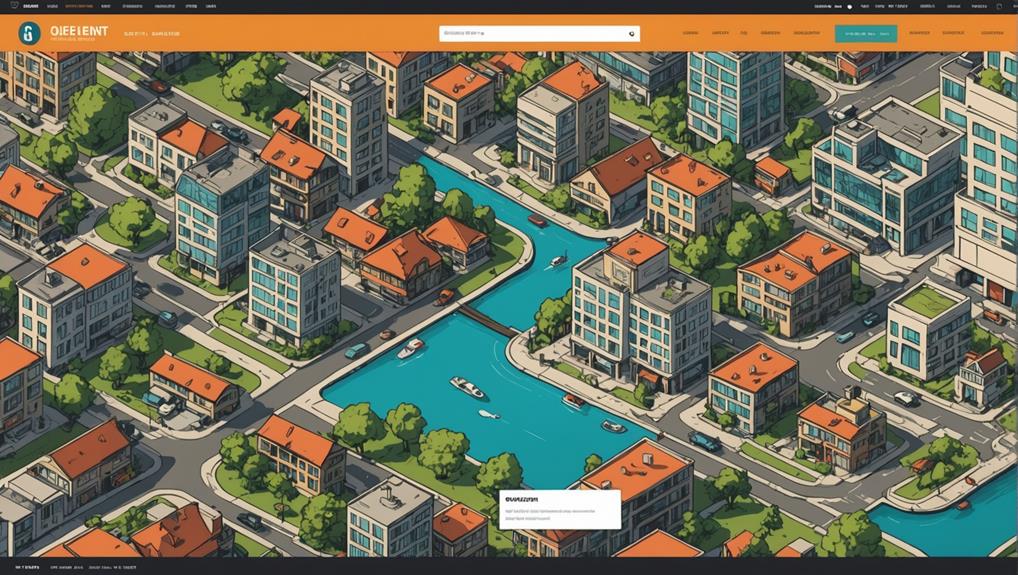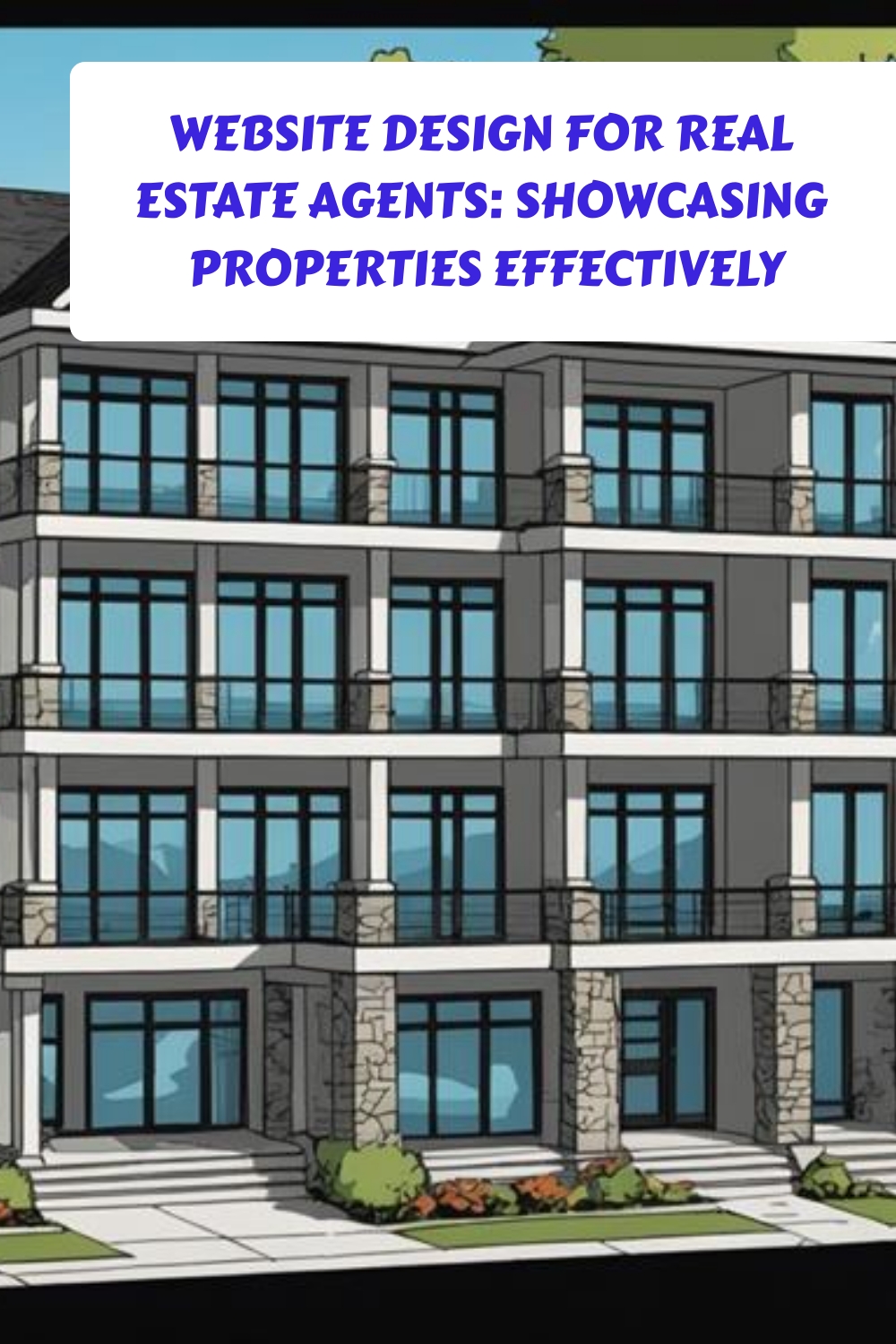
If you're a real estate agent, having a well-designed website is key to showcasing properties effectively. First, use high-quality images and videos to grab potential buyers' attention. Make sure your site has user-friendly navigation with a clear search bar, so visitors can find what they need easily. Mobile-friendliness is a must, considering most people search on their phones. Don't forget about SEO strategies, like using local keywords, to boost visibility. By creating engaging content and offering virtual tours, you can keep buyers interested. There's so much more to explore that can help you stand out in today's market.
Key Takeaways
- User-friendly navigation with advanced filters ensures easy access to property listings, enhancing user satisfaction and reducing search time.
- High-quality visuals, including photos and virtual tours, significantly boost engagement and convey property features effectively.
- Implementing SEO strategies, like keyword optimization and local SEO, increases visibility and attracts potential buyers to the website.
- Integrating essential tools, such as CRM and market analysis, fosters strong client relationships and improves follow-up processes.
- Utilizing multimedia elements like drone footage and 3D walkthroughs enhances property showcasing and can lead to a substantial increase in inquiries.
Importance of Real Estate Websites

In today's digital age, nearly every real estate agent recognizes the importance of having a strong online presence. A well-designed real estate website isn't just a nice-to-have; it's crucial for success. With 81% of REALTORS posting their listings online, your website serves as a primary marketing channel. This means your property listings can reach countless potential buyers right from their screens. With tailored solutions available for specific needs, custom brand building services can help your website stand out in a crowded market.
Imagine a homebuyer scrolling through listings late at night. If your website stands out, they might just click on your property. In fact, over 51% of buyers first discover homes online. By focusing on effective real estate website design, you can enhance your visibility. A custom website can attract high-end clientele, as 69% of agents already know.
Keeping in mind that 47% of aspiring homeowners prefer searching online, it's imperative to create an inviting, easy-to-navigate platform. This not only showcases your properties but also builds trust with your audience. So, embrace the challenge! Building a strong online presence can open doors to new opportunities and help you connect with more clients than ever before. Your future in real estate just might depend on it.
Key Design Features
When designing a website for real estate, it's crucial to focus on user-friendly navigation and striking visual elements. A clean layout helps visitors find what they're looking for without getting lost, while high-quality images showcase properties beautifully. By combining these features, you create an inviting space that not only attracts potential buyers but also makes their search enjoyable.
User-Friendly Navigation
Creating a seamless user experience hinges on user-friendly navigation in real estate websites. When you design your site, think about how potential clients will interact with it. An organized layout helps visitors efficiently access listings and property details, making their journey smoother. A centralized search bar is a must; it allows users to filter results based on their needs, which enhances engagement and keeps them exploring your site longer.
Consider adding advanced search filters, too. This way, you can categorize properties, making it easier for users to find exactly what they're looking for. A well-structured navigation path decreases search time and boosts client satisfaction. Remember, about 47% of aspiring homeowners rely on online property searches, so your user interface needs to be as simple as it is effective.
Lastly, don't overlook mobile responsiveness. With more people browsing on smartphones and tablets, ensuring your website is mobile-friendly is essential. This way, users get a superior browsing experience, whether they're at home or on the go. By focusing on these key features, you'll create a welcoming environment that encourages potential buyers to explore and connect with your listings.
Striking Visual Elements
User-friendly navigation sets the stage, but striking visual elements take your real estate website to the next level. You want to grab potential buyers' attention right away, and high-quality visuals, like professional photos and virtual tours, are vital. Did you know that 95% of home buyers find video helpful in their search? Using engaging multimedia content, such as interactive floor plans or drone footage, can make your listings come alive, keeping visitors on the page longer.
A clean and modern design enhances user experience, too. In fact, 75% of people judge a company's credibility by its website design. Incorporating effective color schemes can influence how clients feel about your properties. For instance, using blue can create a sense of trust and might even boost purchase likelihood by 52% when done right.
When your site has clear categories and advanced search filters, it simplifies the decision-making process. This is important since 47% of aspiring homeowners prefer looking online. So, remember: combining stunning visuals with a thoughtful design not only showcases your properties effectively but also connects you with potential buyers in a meaningful way.
Enhancing User Experience

To enhance user experience on your real estate website, a clean and intuitive design is essential. When visitors can navigate easily, they're more likely to engage with your listings and find what they need quickly. Here are some key elements to focus on:
- Responsive design: Make sure your site looks great on all devices, especially since 47% of homebuyers search on mobile!
- Advanced search filters: Allow users to refine their searches based on specific criteria, like price, location, or property type.
- Fast loading times: Keep your pages loading quickly; even a one-second delay can reduce conversions by 7%.
- High-quality visuals: Use professional photos and multimedia to grab attention and make your listings stand out.
SEO Strategies for Visibility
When it comes to making your real estate website stand out, using the right SEO strategies can be a game changer. By focusing on keyword optimization, creating high-quality content, and utilizing local SEO techniques, you can help potential clients find your listings more easily. These steps not only boost your visibility but also make your website a go-to resource in the competitive real estate market!
Keyword Optimization Techniques
Keyword optimization is essential for real estate agents looking to boost their online visibility and attract potential buyers. By using effective strategies, you can improve your website's search engine rankings, making it easier for buyers to find your properties.
Here are some key techniques to reflect on:
- Incorporate relevant keywords in property descriptions, meta tags, and headers.
- Utilize local SEO strategies by including neighborhood-specific keywords to attract regional clients.
- Regularly update your content with fresh listings and blog posts to keep your site active.
- Build backlinks from reputable real estate websites and local news sources to enhance your domain authority.
When you create keyword-rich content that answers common buyer questions, you'll see an increase in organic traffic and engagement. This means more potential buyers discovering your listings! Remember, the online market can be competitive, but with the right keyword strategies, you can stand out and reach your audience effectively. Embrace the challenge of optimizing your website, and watch as your hard work pays off in improved visibility and connections with buyers enthusiastic to find their dream homes.
High-Quality Content Creation
Creating high-quality content is a game-changer for real estate agents aiming to enhance their online presence. When you include high-quality images and detailed property descriptions, it grabs the attention of potential buyers. Listings with rich content, like virtual tours, stand out and increase your chances of conversion. People want to see what they're buying, and great visuals help them imagine their new home!
It's also important to keep your website fresh. Regular content updates, like articles about market trends, signal to search engines that your site is active and relevant. This can improve your search rankings, making it easier for buyers to find you. Don't forget to use meta tags and descriptions effectively. These little snippets can attract users on search result pages, boosting your click-through rates.
Tracking your website analytics is essential too. It helps you see which keywords and content work best. By refining your SEO strategy based on this data, you can maximize visibility and user engagement. Remember, the goal is to connect with your audience and provide them with the information they need to make informed decisions. Your hard work and creativity will pay off!
Local SEO Strategies
Local SEO strategies are essential for real estate agents looking to boost their visibility in competitive markets. By optimizing your website with neighborhood-specific keywords, you'll connect better with potential buyers. Here are some effective tips to enhance your local presence:
- Register on Google My Business to improve your local search rankings.
- Verify your NAP (Name, Address, Phone number) is consistent across all platforms.
- Create engaging content about local events and community amenities.
- Use location-based imagery in your property listings.
Focusing on these local SEO strategies will help you stand out among other real estate website examples. Highlighting local amenities not only attracts visitors but also keeps them engaged. Additionally, backlinks from reputable local websites can enhance your site's authority. This means more people will find your listings when they search online.
Essential Tools for Agents

Every successful real estate agent relies on a set of essential tools that streamline their operations and enhance client relationships. One of the most important tools is a CRM tool. It helps you track leads, ensuring you follow up with clients on time and communicate in a personalized way. This can make a big difference in building trust.
Another crucial resource is the Integrated Multiple Listing Service (MLS). With MLS integration on your website, you can showcase thorough property listings that include detailed descriptions and stunning images. This not only attracts potential buyers but also keeps them engaged.
Let's not forget scheduling tools. These handy apps make it easy for clients to book property viewings or consultations. This convenience encourages more interactions and shows you value your clients' time.
Lastly, market analysis tools help you understand property trends and neighborhood statistics. By providing informed advice on pricing and investment potential, you position yourself as a knowledgeable agent. Using these essential tools, you can navigate the real estate world more effectively and create lasting relationships with your clients. They'll appreciate your dedication, and you'll feel accomplished!
Effective Communication Methods
While establishing effective communication methods is essential for real estate agents, it's important to focus on tools that facilitate direct interaction with clients. These tools not only help you connect better but also boost lead generation. Here are some effective methods you can use:
- Accessible contact forms on your listings and homepage make it easy for clients to reach out.
- Chatbots offer real-time responses to inquiries, making communication quicker and smoother.
- Client testimonials showcase your success stories and build trust, helping potential clients feel confident in your skills.
- Clear call-to-action buttons, like "Schedule a Tour" or "Contact Us," encourage user interaction and increase consultations.
Marketing Techniques for Engagement

Engaging potential clients goes beyond just effective communication; it involves employing marketing techniques that capture their interest and encourage interaction. Start by enhancing your website with high-quality visuals like professional photographs and video walkthroughs. These can boost property engagement by up to 80%, creating emotional connections with potential buyers.
Don't forget about social media! Since about 98% of millennials use it for property searches, integrating these platforms into your website can notably enhance client engagement. Make sure you include compelling call-to-action prompts, such as "Schedule a Tour" or "Contact Us." Placing these strategically can increase lead generation by over 30%.
Also, consider using personalized email marketing campaigns. Sharing valuable content about market trends and new listings can foster stronger relationships with clients, leading to a 122% increase in ROI when you target specific segments.
Lastly, prominently display client testimonials on your website. When 79% of consumers trust online reviews as much as personal recommendations, these testimonials serve as essential social proof, enhancing trust and credibility. With easy navigation, your site becomes a powerful tool for connecting with potential clients and guiding them toward their dream properties.
Showcasing Properties With Multimedia
Showcase your properties like never before by leveraging multimedia elements that captivate potential buyers. Using high-quality property images and engaging videos can attract up to 80% more interest, making your listings stand out. Plus, incorporating virtual tours lets buyers explore homes remotely, increasing engagement by 40%. This enhances their viewing experience, making them feel like they're really there!
Here are some multimedia elements you should consider:
- High-resolution property images to highlight stunning features.
- Virtual tours that allow remote exploration of homes.
- Drone footage to showcase property surroundings and context.
- 3D walkthroughs for a thorough view of each space.
These multimedia tools don't just make your listings pretty; they can also improve your SEO. By keeping visitors on your page longer, you can enhance your search rankings. In fact, properties featuring these advanced technologies see a 60% increase in inquiries! So, embrace these tools, and watch as your listings attract more attention. It's time to elevate your real estate game, making the home-buying process exciting and interactive!
Analyzing Performance Metrics

Understanding performance metrics is essential for optimizing your real estate website. By tracking website traffic, you can see how many visitors are checking out your listings. This data helps you understand which properties catch people's interest. If you notice high bounce rates, it might mean visitors leave quickly, signaling a need for improvement.
Conversion rates are equally important. These numbers tell you how many visitors become leads after filling out contact forms. By analyzing this, you can adjust your call-to-action buttons or the placement of your forms to maximize effectiveness.
You should also explore Google Analytics. It offers insights into user demographics and behavior flow, allowing you to tailor your content to better engage potential clients.
Don't forget about A/B testing! This method lets you experiment with different headlines or images to see what resonates best with your audience. It's like a test drive for your website design.
Frequently Asked Questions
What Is the Best Website for Real Estate Agents?
The best website for real estate agents combines top website platforms with real estate SEO. Look for features like mobile responsiveness, high-quality visuals, and integrated property searches to enhance user experience and attract potential buyers.
How Do I Make My Real Estate Website Stand Out?
To make your real estate website stand out like a vibrant painting, incorporate unique design elements and mobile optimization strategies. Use effective property showcases, engaging visuals, and client testimonials to capture attention and boost credibility.
How Do I Create a Real Estate Agent Website?
To create a real estate agent website, focus on responsive design, implement effective SEO strategies, and choose a content management system that simplifies updates. This approach enhances user experience and attracts potential clients to your listings.
Should I Make a Website as a Real Estate Agent?
If you want to catch more fish, you gotta cast your net wide. Creating a website as a real estate agent helps target your audience, showcases branding elements, and develops a content strategy to attract clients.
Final Thoughts
In the world of real estate, your website is like a shining lighthouse guiding potential buyers to their dream homes. By embracing design features, enhancing user experiences, and using smart marketing techniques, you can light the way for your clients. Remember, every click brings you closer to a connection. Though challenges may arise, staying optimistic and adaptable will help you navigate the waves. With dedication and creativity, you can transform your website into a powerful tool for success.




